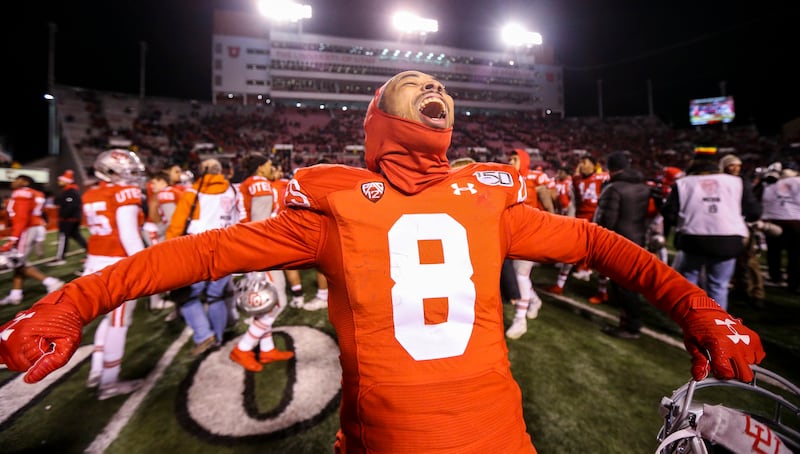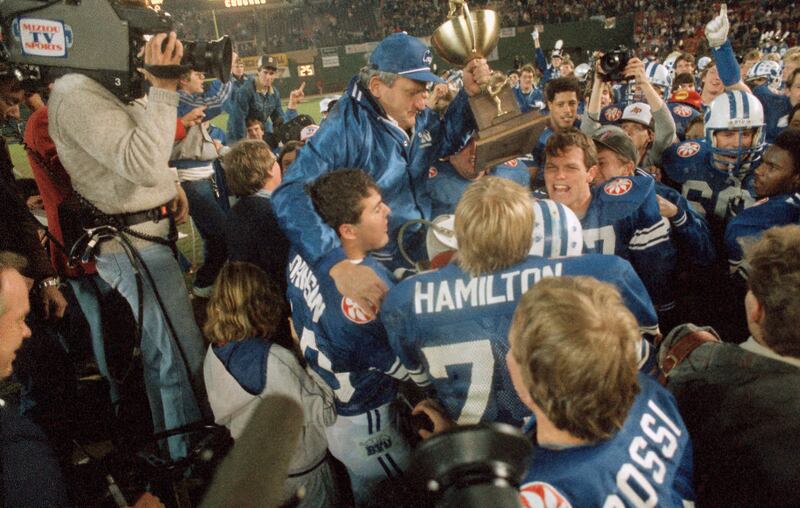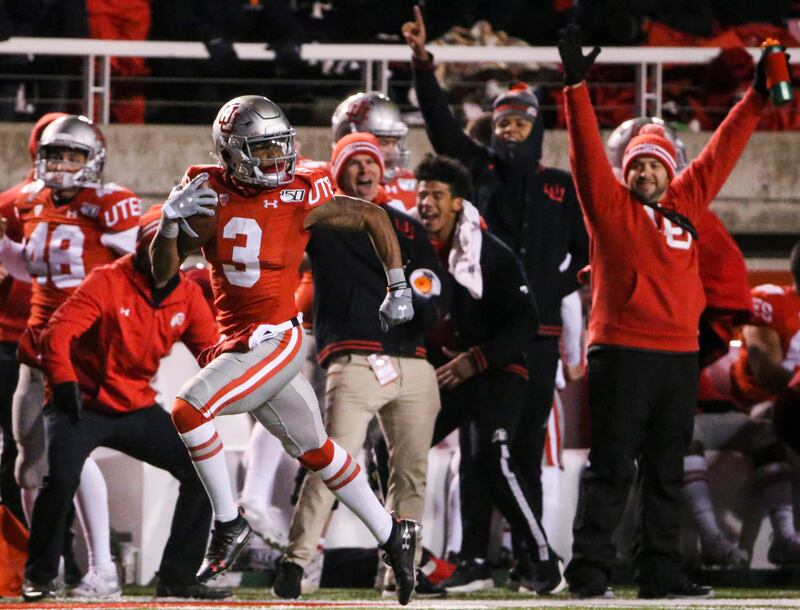SALT LAKE CITY — Four college football teams will be picked this weekend for a shot at the national championship. Is Utah worthy?
Thirteen people will decide. They’ll congregate on Friday at the Gaylord Texan Hotel in Dallas. They’ll arm themselves with note pads and laptops, lean back in office chairs and watch the Pac-12 championship. They’ll do it again Saturday, taking in the remaining conference championship games on a platoon of flat-screen TVs. And when the day is done, the group of 13 will retreat to a private room, where debate will rage into the early hours of Sunday morning.
Thirteen qualified opinions, ranging from former Virginia Tech football coach Frank Beamer to Arizona State journalism professor Paola Boivin to former U.S. Army Chief of Staff Ray Odierno, will clash and scrape until the 13 experts retire for the night. They’ll return at 7 a.m. Sunday, ready to decide what four teams will play in the College Football Playoff.
If Utah beats Oregon Friday, will it earn a place in the four-team tournament?
Perhaps. But what about Oklahoma/Baylor? Or Georgia? Assuming the top three win this weekend, as many as three teams could have a legitimate claim to the last spot in the College Football Playoff.
Leading up to Sunday’s selection show, their fan bases will call radio shows and invade message boards and perform the social media equivalent of banging pots and pans together, clamoring for their team in a system that, until 10:15 MST Sunday morning, will keep them wondering.

But wonder isn’t just a verb meaning to ponder some uncertainty. It’s also a noun, meaning awe or fascination. And in this case, keeping fans wondering may imply both parts of speech. Yes, Utah fans will no doubt wonder with toe-tightening trepidation whether the Utes — assuming they beat Oregon — will qualify. And if they don’t, they’ll continue to wonder what the College Football Playoff selection committee was thinking.
They’ll also immerse themselves for more than 24 hours in a tangle of potential scenarios that, regardless of how they unfold, won’t determine the definite composition of the postseason. Subjectivity, anticipation and, yes, wonder — the yearly fascination that distinguishes college football’s postseason from that of any other sport — will accompany selection Sunday.
If past years hold up, there will also be frustration. In five years, just 10 teams have made the playoff. Alabama has qualified all five times. But that doesn’t mean picking them is easy, and this year illustrates why: If Utah wins the Pac-12; if Georgia either beats or loses a close game to LSU; if Ohio State and Clemson win the Big Ten and ACC, respectively; and regardless of who wins the Big 12, the committee will have to distill six deserving teams into four. As the CFP’s own website acknowledges, doing so is an art; not a science.
“It’s up to each member to subjectively decide,” Bill Hancock, executive director of the College Football Playoff, acknowledged. “It’s a complex sport, and analyzing it, therefore, is complex.”
But the mystery and interest — the duality of wonder — also make college football highly discussed and debated, inviting a question: What’s more important: crowning a champion in the fairest way possible, or in the most exciting way possible? And are the two mutually exclusive?
The history of college football’s national championship
To understand the question, let’s retreat to 1984. Back then, a champion was crowned by the AP Poll and the Coaches Poll, voted by writers and coaches, respectively. Bowl games played on New Year’s Day were usually the deciding factor. Forget a playoff; there wasn’t even a championship game. Which allowed undefeated BYU to win the title that year after a Holiday Bowl victory over the 6-5 Michigan Wolverines on Dec. 21, muting the traditional excitement of New Year’s Day.
Barry Switzer, coach of second-ranked Oklahoma, protested BYU’s title. He wasn’t alone. The Cougars, opponents argued, didn’t play anyone decent in the Western Athletic Conference. BYU opened with a victory over then third-ranked Pittsburgh, but critics said they didn’t beat any schools that finished ranked among the top 25. But BYU finished No. 1 in both polls and won its only national championship as the year’s only undefeated team.

Fans of both Oklahoma and BYU were left to wonder — for a lifetime — what would’ve happened had the schools met. Wonder may be an exciting feature of college football, but wondering who was better among the nation’s top two teams seemed like too much of it. Split polls — like in 1991, when Miami claimed the AP title and Washington claimed the Coaches title after both went undefeated — likely contributed to changes that reduced the uncertainty. But the 1984 BYU season sowed the seed.
“It definitely played a role,” said Malcolm Moran, a longtime sports reporter and director of the sports capital journalism program at Indiana University-Purdue University Indianapolis. “The message that outcome sent was that New Year’s Day had this huge hole in it.”
The Bowl Coalition was formed in 1992 as an agreement between prominent bowl games and conferences to promote more legitimate national championship games. It morphed into the Bowl Alliance in 1996. Both made the title more compelling and official, but neither could strike a deal with the Rose Bowl, which meant neither the Big 10 or Pac-12 champion — which always played in the Rose Bowl — would ever play in the championship, even if they were the top-ranked teams.
The Bowl Championship Series (BCS) changed that in 1998. With the blessing of the Rose Bowl, computer algorithms and human polls determined the nation’s top two teams, regardless of conference. This, of course, wasn’t a controversy-free system, as undefeated Auburn learned when it was left out of the championship game after the 2004 season. But it allowed for matchups like the following year’s unforgettable Rose Bowl between Texas and Southern California, when Vince Young led the Longhorns to a fourth-down touchdown with 19 seconds left to lift Texas over USC’s Heisman winners Matt Leinart and Reggie Bush.
Toward the middle of the fourth BCS contract in the fall of 2011, a group of university presidents and conference commissioners started talking about trying something else. Commissioners proposed a four-team playoff to last 12 years on June 26, 2012. The NCAA approved the new format that August, thus creating the College Football Playoff.
Its advent brought with it criteria for judging scenarios like this weekend’s potential three-team argument. When teams appear similar, the committee is to consider championships won, strength of schedule, head-to-head competition and comparative outcomes against common opponents. Hancock emphasized these criteria are only applied after teams are deemed similar, which can be a more convoluted designation than it appears.
“To get there, they will look at every aspect of a team’s season, down to the minutiae,” he said, down to whether a team ever played difficult back-to-back games. “Once you look at all the factors the committee looks at, there wouldn’t be enough space to print them.”

There’s no guarantee the committee will believe Oklahoma, Georgia and Utah are similar. But it seems like a reasonable possibility. And if so, it’s unclear how the criteria would settle things — especially between the Utes and Sooners. Utah and Oklahoma would both have conference championships. They haven’t played each other. Their strength of schedule is comparable, with Oklahoma’s ranked 19th in the country and Utah’s 29th entering this weekend. And their only common opponent is UCLA, which Oklahoma beat 48-14 and Utah thrashed 49-3.
How, then, does the committee decide?
In weighing the Utes’ resume against the winner of Oklahoma-Baylor, will the committee consider that Utah was missing one of its best players, star running back Zack Moss, when it lost at USC? Will it consider that USC beat the Utes with its third-string quarterback? Will it consider each game’s margin of victory? Or will the Baylor-Oklahoma matchup this Saturday vault the winner ahead of Utah?
“A Utah fan would have to wonder,” Moran said, “if the Baylor-Oklahoma winner will benefit because the losing team was highly ranked.”
It’s clear, then, that wonder remains, although perhaps in a different form from the poll era. Still, some would like to see the playoff become more inclusive.
More changes ahead?
Liberty University athletics director Ian McCaw has more direct experience than most when he argues for expanding the playoff.
“From the inception of the College Football Playoff, I was an advocate for an eight-team playoff,” said McCaw, who helmed Baylor when the Bears were left out at No. 5 as Big 12 champs in 2014. “I just think the best model is eight teams, take the five Power Five conference champions, the best team out of the Group of Five, and then have two at-large spots.”
It’s one of many proposals aimed at enhancing college football’s postseason without diminishing the excitement of the regular season. Is there a perfect number? Twenty-four teams make the FCS playoff, after all, and few observers complain. Although few without direct connections to the competing schools care, either.
McCaw wants the nation’s best team to be determined on the field. He cited Baylor’s hiring of a public relations firm to plead its case in 2014 as evidence of the current system’s shortcomings.
“It just shows you how when you’re not settling a championship on the field, and you’re settling it in a subjective manner based on a committee vote, it really opens up a lot of criticism,” McCaw said. “It certainly creates a lot of narrative and discussion and controversy and all of those things, but I think they’re best set aside.”
Moran, meanwhile, favors a six-team playoff, which he said could provide a path for all Power Five programs, maintain the intrigue of an at-large selection, and shift the debate from who’s No. 4 to who’s No. 2, since the top two schools would earn quarterfinal byes.
The ultimate question of playoff expansion returns to the original question presented here: Can organizers include more deserving teams without sacrificing regular-season excitement and end-of-year intrigue?
We’ll likely have a better idea of what the future holds in 2022, said CBS Sports reporter Dennis Dodd, who’s covered the College Football Playoff extensively. The current format expires in 2025, and organizers will need a three-year window to negotiate new media rights. Things could, of course, stay the same. Hancock assured the Deseret News that no changes are imminent. But he also didn’t shut the door.
“My bosses are pleased with the CFP,” he said, “but they are talking about the future.”
‘Delightful and stupid’
A playoff’s goal is both simple and complex: To determine the best team in the unpredictable terrain of sports. This seems contradictory. “Best” exists as an absolute. But because of the entropy inherent in competition, no result can ever truly be absolute; the best team in any sport is unlikely to beat the second-best team 10 consecutive times.
That’s why in the NFL or NBA or pretty much any other professional sports league, teams qualify automatically by winning divisions or placing in conferences. They play division or conference opponents multiple times, allowing the best teams to bubble to the top in the most empirical way possible. College football’s 130 teams, plus the brutality of the sport, plus the polarization between the haves and have-nots, make such a system impossible. So determining the “best” college football team will, in some measure, always be subjective — it’ll always carry its unique wonder.
Some argue that maximum subjectivity makes for more fun, like Washington Post sports columnist Norman Chad.
“Back in the old days,” he wrote just over a year ago, “there was no national championship mechanism in Division I college football. The coaches voted on a No. 1 team, the media voted on a No. 1 team, and when they disagreed, every talk radio host’s head exploded until the cows came home — the cows even had an opinion — and this was all delightful and stupid.”

The BCS, he argued, made the process less delightful and stupid, while the College Football Playoff diminished the delight but magnified the stupidity. He was especially critical of the small number of teams that seem to hoard playoff spots. “The last Russian presidential election — theirs, not ours — was,” he wrote, “less preordained than the CFP.”
Chad seems to tap into something. College football’s unique bend toward subjectivity does incubate more discussion and more storylines and more debate, and as a fan, that feels like a good thing. That isn’t to say the CFP committee should go full WWE and craft matchups based purely on amplified drama and elevated narratives; the foremost goal, after all, remains giving the best teams a chance at a championship.
As Dodd summarized: “That’s what it should accomplish. But that’s all subjective.” And for that reason, Moran said, “I think there will always be room for mystery, debate, argument and spirited discussion.”
Utah must beat Oregon to have a shot at a national title. So whether Utah is in or out come Sunday, and in or out of the playoff — regardless of what form it takes — in the coming years, expect the wonder of wondering to remain.


